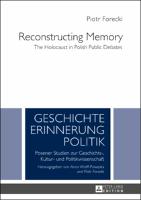Reconstructing Memory
The Holocaust in Polish Public Debates
Abstract
The book aims to reconstruct and analyze the disputes over the Polish-Jewish past and memory in public debates in Poland between 1985 and 2012, from the discussions about Claude Lanzmann’s Shoah, Jan Błoński’s essay The Poor Poles Look at the Ghetto, Jan Tomasz Gross’ books Neighbours, Fear and Golden Harvest, to the controversies surrounding the premiere of Władysław Pasikowski’s The Aftermath. The analysis includes the course and dynamics of the debates and, most importantly, the panorama of opinions revealed in the process. It embraces the debates held across the entire spectrum of the national press. The selection of press was not limited by the level of circulation or a subjective opinion of their value. The main intention was to reconstruct the widest possible variety of opinions that were revealed during the debates. Broad symbolic elites participated in the debates: people who exercised control over publicly accessible knowledge, legitimacy of beliefs and the content of public discourse.
Keywords
Anti-Semitism; Auschwitz; Birkenau; collective forgetting; Collective memory; Debates; Forecki; Holocaust; Jedwabne; Memory; Polish; Public; Public discourse; ReconstructingDOI
10.3726/978-3-653-03675-6ISBN
9783653036756, 9783631623657, 9783653036756Publisher website
https://www.peterlang.com/Publication date and place
Bern, 2013Series
Geschichte – Erinnerung – Politik. Studies in History, Memory and Politics, 5Classification
History and Archaeology
21st century, c 2000 to c 2100
Social and cultural history
Philosophy
Sociology
Political science and theory


 Download
Download